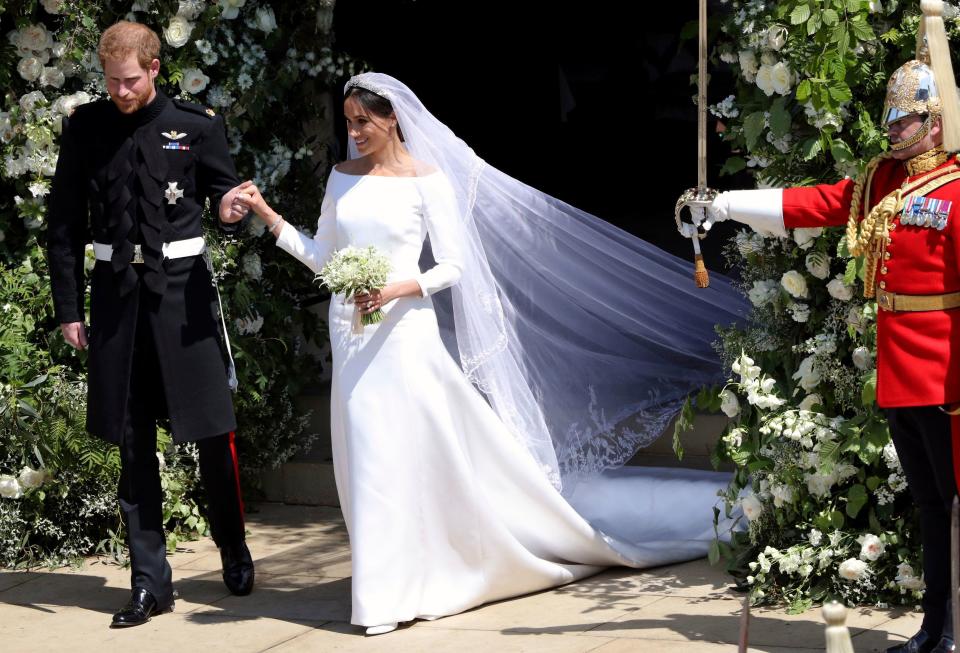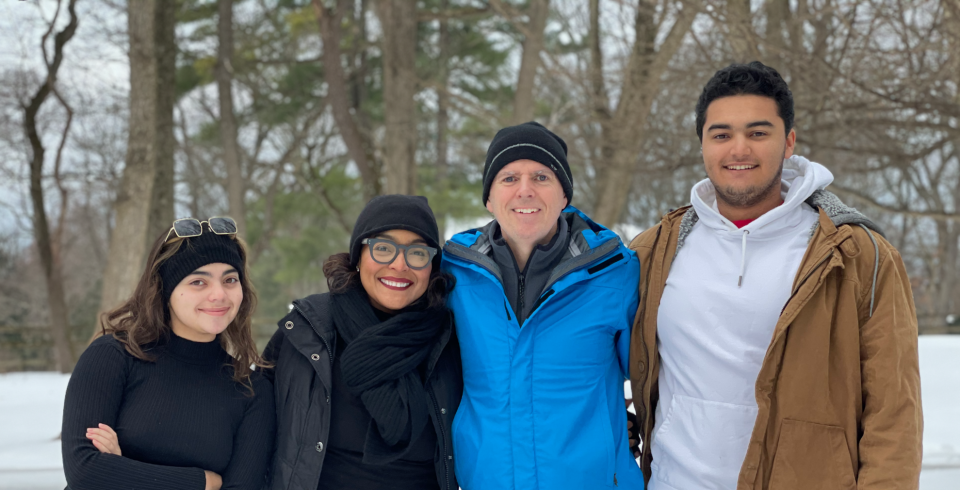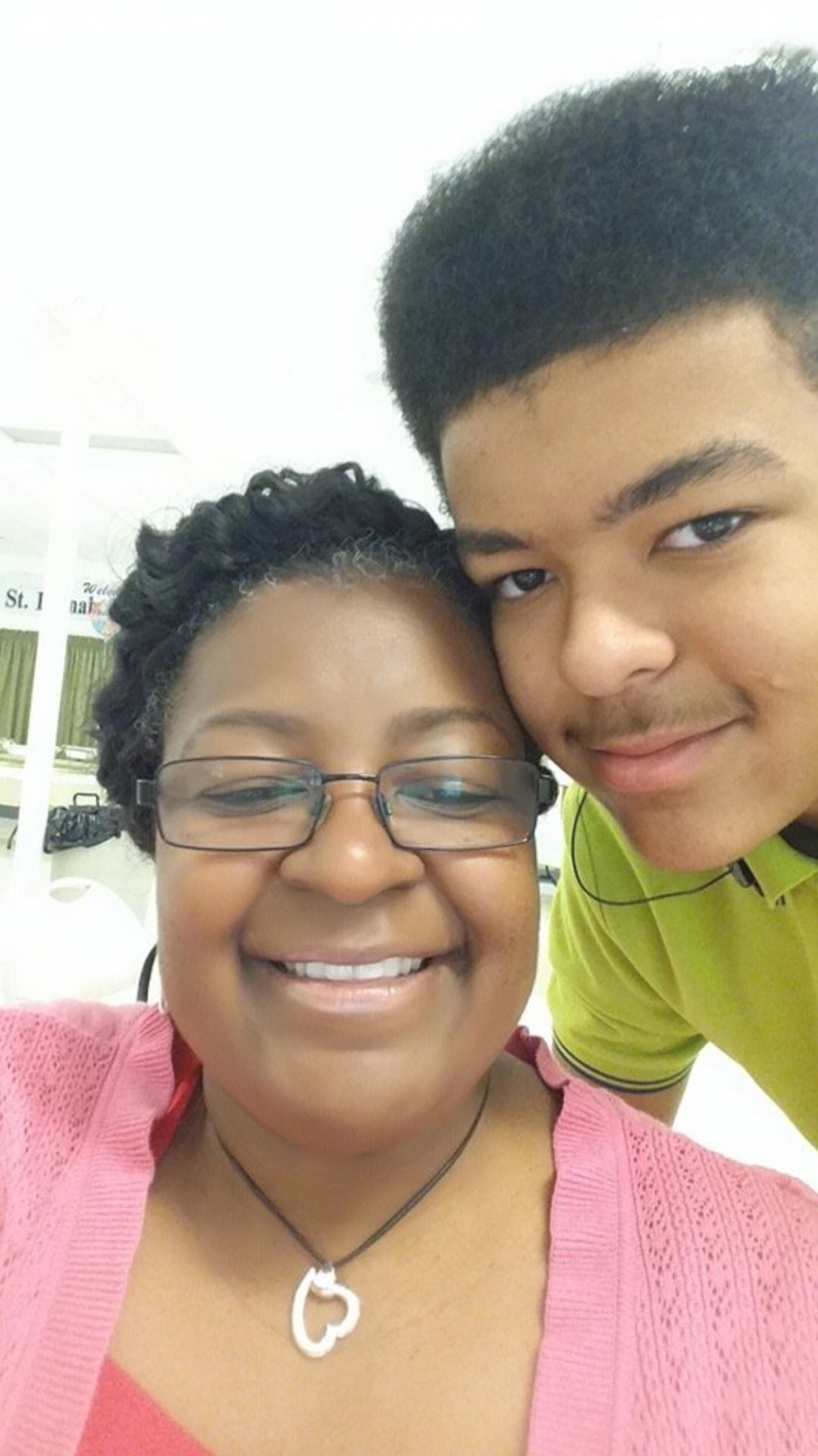Meghan and Harry interview stirs painful memories for many interracial couples
Days after Teresa and Stephan Beall's son was born 17 years ago, she remembers some of her husband's white relatives stopping by to see baby Ryan, who was swaddled in his bassinet.
“Oh! His hair is straight,” Teresa Beall, who is Black, recalled one of them saying. The remark made her angry. The words weren’t necessarily about color, but the message was clear.
She thought to herself: And so it begins.
The exchange came to mind Sunday night as Teresa and Stephan Beall, an interracial couple in Brandywine, Maryland, watched Oprah Winfrey’s highly anticipated two-hour interview with Prince Harry and Duchess Meghan. During the interview, Meghan said she and her husband were told during her first pregnancy that her son, Archie, could not get royal security without a title. She said unnamed palace officials had expressed “concerns” about the color of the unborn baby’s skin.
"In those months when I was pregnant, and at the same time there was talk about no title, no security, and also conversations about how dark his skin might be when born,” said the duchess, who identifies as biracial and has a Black mother and white father.
Meghan and Harry would not elaborate further, though Winfrey said Monday on "CBS This Morning" that Harry said neither Queen Elizabeth nor Prince Philip were involved in those conversations.
The comments appeared to resonate with many Americans who have dated outside their race, some of whom took to social media to describe similar moments of racism or discomfort they encountered while interacting with their loved one's relatives.
Teresa Beall, who has been married for 31 years, said the Duchess of Sussex's comments came as no surprise, and she suspects Meghan probably will face similar experiences in the future.
“She’s definitely telling the truth,’’ said Beall, 51. “I felt bad for her.”

Living as a hyphenated American
The interview with the Duke and Duchess of Sussex, who stepped away from their duties as senior British royals in January 2020, drew 17.1 million viewers – the highest audience thus far this TV season for a non-sports broadcast. It came just weeks after the couple announced they were expecting their second child.
In the interview, Meghan said the stress and isolation of living as a member of the royal family was so crushing it prompted thoughts of suicide.
"I didn't want to be alive anymore," she said, overcome with emotion. "I was ashamed to admit it to Harry, but I knew if I didn't say it, I would do it. I just didn’t want to be alive anymore. It was clear, it was real, it was frightening, and it was a constant thought."
Casey Mendoza, a Chicago-based journalist, said she was surprised by how much she related to Meghan. A 26-year-old Filipino American, Mendoza said she also was welcomed into her partner's privileged white family, who were unfamiliar with the experience of living as a hyphenated American, “where you are constantly never enough of one thing.”
Mendoza is engaged to be married next year to her fiance, Kyle Connor, who is white. While both families have supported their eight-year relationship, she said, it can be taxing to explain microaggressions.
“They aren’t malicious moments, but they are exhausting,” she said, adding that one of her biggest fears “is not knowing how to raise a biracial child.”
'Staring is its own form of violence'
Romantic partnerships have become increasingly diverse in the United States, but marriages between white and Black Americans remain rare.
In 1967, when miscegenation laws were overturned in the United States, 3% of all newlyweds were married to someone of a different race or ethnicity, as reported by the Pew Research Center.
About 10% of all married households are interracial or interethnic, according to the U.S. Census. Most are between white and Hispanic Americans, an ethnic group that largely identifies as white. Just 11% of interracial marriages are between Black people and white people.
Aurora Archer, 53, an entrepreneur, was born nine months after the Supreme Court decision that allowed for interracial marriage. Her father is African American and her mother is Mexican.
Archer, who identifies as Afro-Latina, is raising two mixed-race children, ages 20 and 18, with her white husband who immigrated from Ireland. She said she was so enraptured by the Winfrey interview, she watched it twice nearly on the verge of tears.
“I hope it brings self-awareness about the underlying impact of race,” said Archer, who lives in the suburbs of Philadelphia.
She said one of her most painful experiences as the mother of biracial children is being dismissed by coworkers or acquaintances who have said her children take after their dad while praising them.

John Drabinski, 52, a white professor of African American Studies at the University of Maryland, whose wife and two sons are African American, said onlookers are often the problem.
“Staring is its own form of violence because people are trying to figure out what this child is as opposed to who this child is,” Drabinski said.
After the Winfrey interview, Drabinski said he hoped viewers would come away with a recognition that the prince chose his wife “over his racist family.”
“For white partners in the relationship, they need to understand that walking away is a possibility and the best choice for your family,” Drabinski said. “There have to be consequences for racism.”
Teaching children to be strong in the face of questioned identity
Winfrey’s interview was conducted on wicker chairs in resplendent surroundings outside a mutual neighbor’s home in Montecito, California, where Winfrey and the couple live. The celebrity journalist attended the royal wedding in 2018, and Winfrey and Harry announced the next year that they would pair on a documentary series about mental health.
In the interview, Harry said there were “real obvious signs, before we even got married, that this was going to be really hard.”
Susan Cole-Haley, a mother of four mixed-race children whose fathers are white, said she had hoped Meghan and Harry’s marriage would help modernize the British monarchy. Still, she wasn’t surprised that Meghan experienced racism.
People often ask about her own children’s hair or appearance, said Cole-Haley, 52, a former Louisiana resident who identifies as Black British and lives in London.
For her, one of the worst episodes of racism occurred immediately after she gave birth to her third child. She noticed the boy’s complexion was yellowing. When she turned to a nurse for help, she said, the nurse scoffed, “Don’t worry dear, that’s just the color of mixed-raced babies.”
It turned out the newborn was jaundiced and needed medical care.
“This is such an example of how structural racism works when people are at their most vulnerable,” said Cole-Haley, a broadcaster and HIV activist. “It’s the same as what happened to Meghan. She was at a place where she couldn’t advocate for herself.”
Arnold Ravick, 67, of Bethesda, Maryland, said that if Meghan’s stories are true, they are “offensive.”
Ravick, who is white, has two daughters, aged 20 and 23, with his wife, Terri, who is Black.
He said it hasn’t always been easy for his daughters, who are also Jewish.
“Their uniqueness doesn’t make them or break them. They’re who they are,’’ he said. “We taught them to be independent, be strong. Don’t back down from a fight. Speak up for yourself. ’’
Some people have asked whether he and his wife adopted one daughter, whose complexion is slightly darker than the other.
“Treating any child differently because of the color of their skin – I would think, to a larger percentage of our society, it’s repulsive, it’s terrible.... It’s bad for everybody.”

In Gainesville, Virginia, Christal Hardy-Greenwell, 52, watched as many Americans debated the Winfrey interview on Twitter Sunday night.
“I don’t think people understand what’s she actually dealing with,’’ said Hardy-Greenwell, who is Black and has been married to a white man, Russell Greenwell, for 17 years. “The only thing they’re looking at is her status. … She didn’t sign up for that.’’
Especially troubling, Hardy-Greenwell said, was Meghan’s revelation that her son wouldn’t have protection because of who his mother was, which she attributed to race.
“That just touched my heart,’’ she said.
Over her years of marriage, Hardy-Greenwell observed people staring at her and her husband while out in public. Once, while out in a club in New York City's Harlem neighborhood, two Black men approached the couple and made remarks about them being of different races. There have also been several times that they were stopped while driving down a highway in Virginia for no legitimate reason. They suspect it was because she is Black.
Hardy-Greenwell said that while she was embraced “from Day One” by her husband’s family, she hopes the attention surrounding the royal couple’s interview helps people better understand the experiences of interracial couples.
“This is always going to be our life when the hype goes down,” she said.
This article originally appeared on USA TODAY: Meghan Markle Oprah interview rings true for many interracial couples

